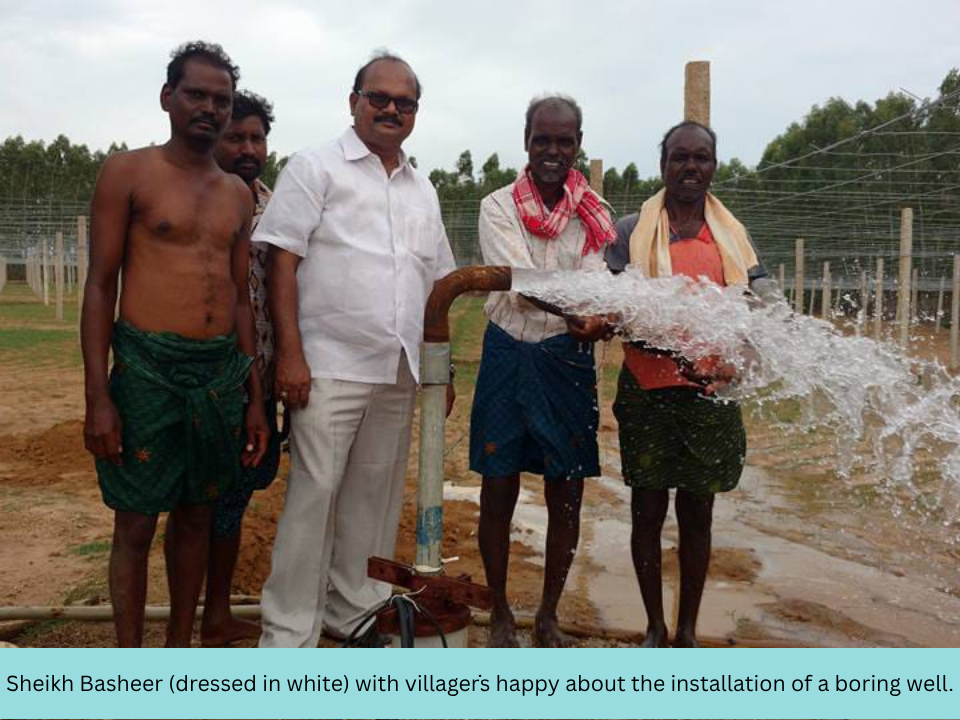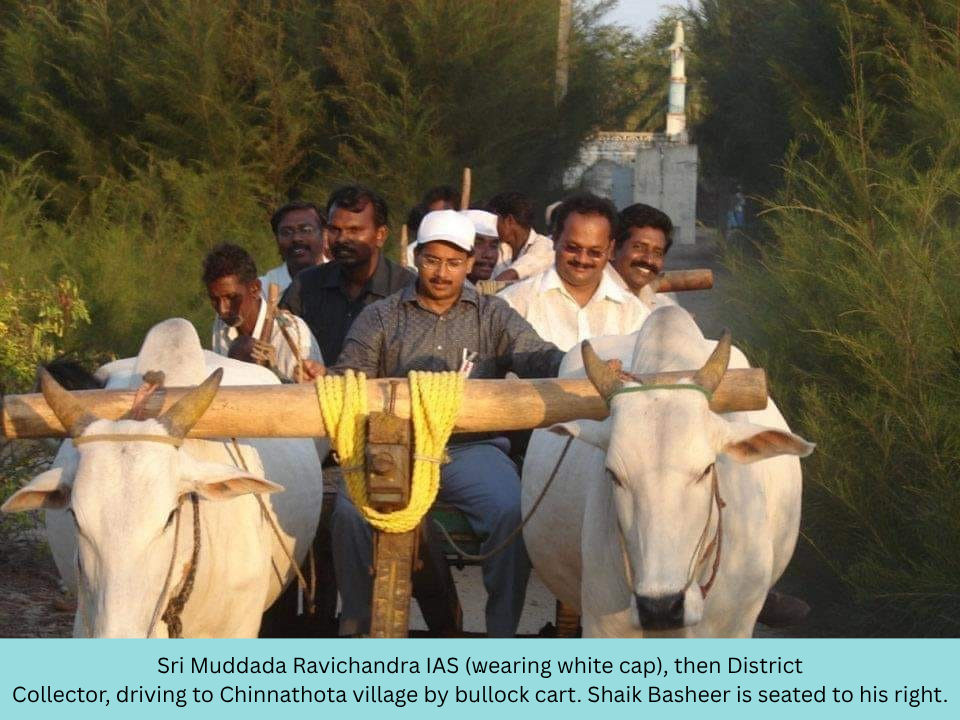Recently Sheikh Basheer received what he called a “deeply touching message” from a new member of an email group that he was part of. The text read as follows: “Good morning everyone, I’m [name redacted for privacy concerns], it’s a great honour to be added to this core group. I come from a humble background—Chinnathota village in Vakadu Mandalam—born into an agricultural family where life was simple, yet full of struggles. The values I carry today were shaped by the soil of my village and the resilience of my people. During my childhood, one person who deeply inspired me was Mr. Basheer sir. At a time when there were no proper roads, no facilities to stay, and hardly any access to food, he would still walk or travel by bullock cart to visit our villages. He moved among us with purpose and dedication, bringing light into our lives when things were darkest. His commitment changed the future of many families, including mine. I am now fortunate to serve as the Managing Director of [company name redacted for privacy concerns], where we focus on aquaculture innovations and farmer-based solutions. Though life has taken me far from those early days, my heart and efforts remain with rural communities. I believe it’s our responsibility to uplift others just like Basheer sir once did for us. Thank you once again for including me in this meaningful circle. I look forward to learning from all of you and contributing to the cause that once shaped my own life.”
Basheer remembers the young man. Chinnathota is one of the most remote Yanadi tribal villages, and Association for Rural Development (ARD) an organisation that Basheer leads, has worked here intensively for several years. The village comes within the Vakadu Mandal sub-division part of the erstwhile SPSR Nellore district, which after the administrative re-organisation of 2022 was transferred to the newly established Tirupati district of Andhra Pradesh. It was once a neglected village with no basic amenities. With years of consistent work and the support of dedicated teams, ARD was able to bring about transformational changes. They supported households to construct pucca houses, worked with the administration to establish a school, a hospital, drinking water facilities, and a community hall. Basheer remembers the historic day in 2007, when Sri Muddada Ravichandra IAS, then District Collector, visited the village by bullock cart—a symbolic journey that led to real development on the ground. The young man who sent Basheer the message, was just a young boy then. Basheer remembers that the young boy ran behind that bullock cart with joy.
It gives Basheer great pride to see how that boy has completed higher education and set up a trading company supporting aquaculture farmers. And now, the young man wants to give back to society—he’s ready to join hands with ARD’s youth group to contribute towards building a better future.
ARD history is founded on the unwavering resolve demonstrated in the launch, in collaboration with ActionAid India (called ActionAid Association from 2006 onwards), of the “Bala-Thae-Jessu/Light of Children”—a lifeline for street children. Then when the 2004 Indian Ocean Earthquake and Tsunami struck, in continuing collaboration with ActionAid India, ARD expanded its activities to work with fisher folk communities and the Yanadi community. The Yanadis are one of Andhra Pradesh’s oldest hunter-gatherer tribes, yet they remain among its most neglected and invisible communities. Traditionally dependent on inland fishing, forest produce, and small-scale foraging, they have been pushed to the fringes of society—denied land rights, government aid, and even basic recognition. Even during the relief operations, the Yanadi community were not able to access support.
Moving beyond immediate relief operations, ARD and ActionAid India have been working with the Yanadi community in the region to enable them to assert rights of land, housing and provided support to enable them to take up multiple means of livelihood.
Today, ARD wages a relentless battle across Nellore District—Kota, Vakadu, Chittamur, Gudur, and beyond—fighting for the Yanadi people. They’ve delved deep into the tribe’s psyche, exposing the scars of neglect and the crushing weight of exclusion.
To Basheer, the young man’s story is a reminder that true impact doesn’t stop with development—it lives on in the people who rise and give back. Basheer says, “Let us continue to inspire and walk with the next generation of change-makers. One step, one village, one life at a time.”
The Biblical book of Ecclesiastes Chapter 11 Verse 1 states: “Cast your bread upon the waters, for you will find it after many days.” The phrase is often interpreted as a metaphor for selfless generosity or good deeds—encouraging people to act kindly or give without expecting immediate returns, trusting that these actions will eventually bring rewards, often in unexpected ways or at a later time. The Hindi equivalents for this saying are neki kar, dariya mein daal (do good and throw it in the river) and the concept of nishkama karma (action without the desire for personal gain).
Social sector initiatives often prove how one strong advance often acts as a catalytic intervention that sets in motion a generative spiral—a cycle of positive, self-reinforcing developments that extend far beyond the initiative’s initial goals. This spiral emerges from individuals gaining confidence and capacity, changing perceptions of women’s roles or caste hierarchies, better local governance through participatory planning and various other multipliers and spillovers that are set into motion. In short, successful social initiatives often generate ripple effects—unlocking capacities, altering social relations, and building solidarity—that far exceed the original vision, affirming the importance of inclusive, rights-based, and participatory approaches in public policy. Like Basheer we need to just lead the people we work with into a self-directed agenda of transformation. Then there is no stopping the change.
 Author: Joseph Mathai based on inputs by Sheikh Basheer
Author: Joseph Mathai based on inputs by Sheikh Basheer


